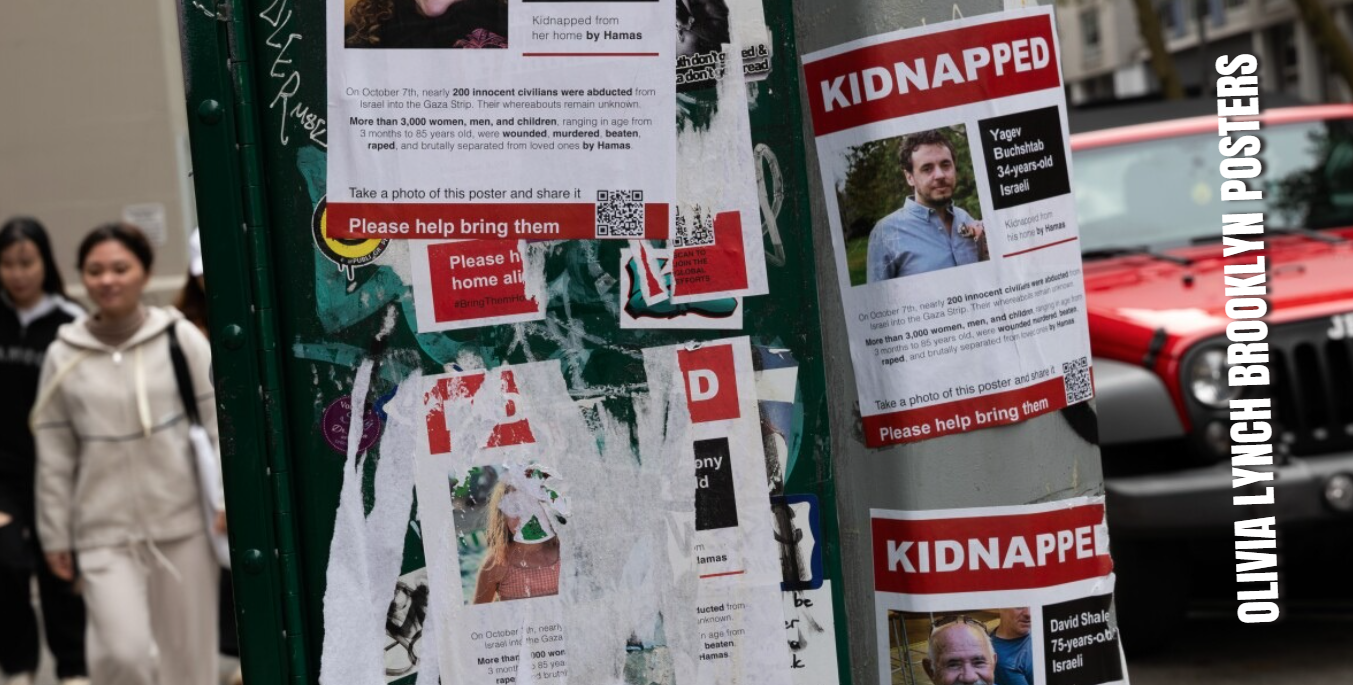The Controversy of Olivia Lynch Brooklyn Posters: A Comprehensive Analysis
1. Introduction to the Olivia Lynch Brooklyn Posters Incident
Overview of the Incident
The controversy surrounding “Olivia Lynch Brooklyn posters” erupted in October 2023 when Olivia Lynch, a Brooklyn resident, was recorded tearing down a poster that raised awareness about Israeli civilians who had been kidnapped by Hamas terrorists.
The incident quickly gained attention, sparking widespread debate on social media, news outlets, and within various communities. This article aims to provide a comprehensive analysis of the event, the surrounding circumstances, and its broader implications.
The Role of Olivia Lynch in the Controversy
Olivia Lynch, previously unknown to the wider public, became the center of a national debate following the incident. Her actions, caught on video, led to intense scrutiny, with opinions ranging from condemnation to defense.
Understanding who Olivia Lynch is and why she might have taken such action is crucial to unpacking the layers of this controversy.
Background on the Israeli Hostages Poster
The poster that Olivia Lynch tore down was part of a broader campaign to raise awareness about Israeli civilians kidnapped during the October 2023 attack by Hamas. These posters, which appeared in various cities around the world, were meant to bring attention to the plight of the hostages and garner international support for their safe return.
The posters featured images and names of the hostages, accompanied by a call for action against the kidnappings.
2. Context and Background of the Conflict
The Israeli-Palestinian Conflict Overview
The Israeli-Palestinian conflict is a long-standing and deeply complex issue, rooted in historical, religious, and political tensions. The conflict has seen numerous escalations over the years, with both sides suffering significant casualties and human rights violations. Understanding this context is essential to grasp the significance of the October 2023 events and the subsequent reactions, including the poster campaign.
The October 2023 Hamas Attack on Israeli Civilians
On October 7, 2023, Hamas launched a surprise attack on Israel, resulting in the deaths of over 1,400 Israeli civilians and the kidnapping of numerous others, including women and children. This attack marked one of the deadliest escalations in the conflict in recent history and triggered a series of responses from Israel and the international community. The hostage situation added a new dimension to the conflict, leading to global calls for their release.
Global Reactions to the Hostage Situation
The kidnapping of Israeli civilians by Hamas was met with widespread condemnation from governments, international organizations, and human rights groups. Many countries, including the United States, called for the immediate release of the hostages and condemned Hamas for its actions. The international community’s response underscored the severity of the situation and the urgency of resolving it.
3. Details of the Poster Incident
What Happened in Brooklyn?
In the days following the October 2023 Hamas attack, posters featuring the faces of Israeli hostages began appearing across Brooklyn. These posters were part of a grassroots campaign aimed at raising awareness and generating support for the hostages. On October 15, 2023, Olivia Lynch was filmed tearing down one of these posters, an action that quickly went viral online. The video showed Lynch methodically removing the poster, sparking outrage and leading to widespread condemnation.
Public and Media Reaction
The public reaction to Lynch’s actions was swift and polarized. Many people condemned her actions as insensitive and disrespectful, particularly in light of the tragic circumstances surrounding the hostages. The media picked up the story, with various outlets covering the incident from different angles. Some focused on the legality and ethics of tearing down public awareness posters, while others explored the broader implications of such actions in a highly charged political environment.
Legal and Ethical Considerations
The incident raised important legal and ethical questions. Legally, the act of tearing down a poster could be considered vandalism or destruction of property, depending on the jurisdiction. Ethically, the act touched on issues of free speech, the right to protest, and the responsibility to respect awareness campaigns, especially those concerning human rights and international conflicts.
4. The Role of Social Media in the Controversy
How Social Media Amplified the Incident
Social media played a critical role in amplifying the Olivia Lynch Brooklyn posters incident. The video of Lynch tearing down the poster was shared widely across platforms such as Twitter, Instagram, and TikTok, garnering millions of views and sparking debates in comment sections and forums. The incident became a trending topic, with various hashtags used to either condemn or defend Lynch’s actions.
Hashtag Campaigns and Online Movements
The controversy led to the emergence of several hashtag campaigns. Hashtags like #JusticeForHostages, #FreeSpeech, and #StopTheHate were used to frame the debate in different ways. These campaigns mobilized both support and opposition, with activists, influencers, and public figures weighing in on the matter. The online movement also extended to petitions and calls for legal action against Lynch.
Public Figures’ Reactions and Endorsements
Public figures, including politicians, celebrities, and activists, reacted to the incident, further fueling the controversy. Some condemned Lynch’s actions, emphasizing the importance of respecting efforts to raise awareness about human rights issues. Others defended her right to express her views, even if controversial, highlighting the complexities of free speech in a polarized society. These endorsements and condemnations influenced public opinion and kept the incident in the spotlight.
5. The Impact on the Brooklyn Community
Local Reactions in Brooklyn
Brooklyn, known for its diverse and politically active population, was deeply affected by the incident. Local residents expressed a range of emotions, from outrage to support for Lynch’s actions. Community meetings and discussions were held to address the tensions that arose, with many residents calling for dialogue and understanding rather than division.
Community Divisions and Discussions
The incident highlighted existing divisions within the Brooklyn community, particularly around issues related to the Israeli-Palestinian conflict. While some community members viewed Lynch’s actions as a legitimate form of protest, others saw it as an attack on an important awareness campaign. These divisions led to heated discussions, both online and offline, about the broader implications of the incident.
Impact on Local Businesses and Organizations
Local businesses and organizations in Brooklyn also felt the impact of the controversy. Some businesses publicly condemned Lynch’s actions, while others chose to remain neutral. Community organizations, particularly those focused on peace and social justice, found themselves in the middle of the debate, trying to navigate the polarized environment while continuing their work.
6. Legal Implications of the Incident
Freedom of Speech and Its Limits
The Olivia Lynch Brooklyn posters incident raised important questions about the limits of free speech. While Lynch’s actions could be seen as an expression of her views, they also involved the destruction of property, which is not protected under free speech laws. The incident sparked discussions about where the line between free speech and illegal activity should be drawn, particularly in cases involving sensitive political issues.
Potential Legal Actions Against Olivia Lynch
There was speculation about whether legal action could be taken against Olivia Lynch for tearing down the poster. Depending on the legal interpretation, her actions could be classified as vandalism or destruction of public property. However, the likelihood of legal proceedings would depend on whether charges were pressed by the authorities or the individuals behind the poster campaign.
Previous Legal Precedents in Similar Cases
Looking at previous legal cases involving similar incidents can provide insight into the potential outcomes for Olivia Lynch. In the past, individuals who destroyed posters or other public materials have faced a range of consequences, from fines to community service. These precedents could influence how the legal system approaches this case, should it go to court.
7. Ethical Considerations and Debates
The Ethics of Protest and Civil Disobedience
The incident involving Olivia Lynch brings to the forefront the ethical considerations surrounding protest and civil disobedience. While protest is a fundamental right in democratic societies, the methods used can sometimes cross ethical boundaries. Tearing down a poster aimed at raising awareness for a humanitarian cause raises questions about the ethics of such actions, particularly when the cause is as sensitive as the plight of hostages.
Respect for Awareness Campaigns vs. Freedom of Expression
There is a delicate balance between respecting awareness campaigns and upholding freedom of expression. Awareness campaigns, particularly those involving human rights issues, are often seen as sacrosanct, deserving of respect and support. However, when these campaigns are viewed as politically charged, individuals like Lynch may feel compelled to protest against them. This creates an ethical dilemma: should all forms of protest be protected, even if they involve actions that many consider disrespectful?
The Role of Intention in Ethical Judgments
Understanding Olivia Lynch’s intentions is key to forming an ethical judgment about her actions. If Lynch’s actions were motivated by a genuine belief in opposing the message of the poster, some may argue that her protest, while controversial, was ethically justifiable. However, if her actions were purely destructive or intended to silence a cause, the ethical implications become more problematic. This distinction is crucial in the ongoing debate about the incident.
8. Olivia Lynch: Public Persona and Background
Who is Olivia Lynch?
Before the poster incident, Olivia Lynch was largely unknown outside of her immediate circles in Brooklyn. However, the controversy thrust her into the public eye, prompting interest in her background, beliefs, and motivations. Lynch is reportedly a politically active individual, with a history of involvement in social justice causes. Understanding her personal and political background helps to provide context for her actions.
Public Perception Before and After the Incident
Public perception of Olivia Lynch changed dramatically after the incident. Before the event, she was an ordinary Brooklyn resident. Afterward, she became a polarizing figure, with some viewing her as a courageous activist and others condemning her as disrespectful and destructive. This shift in public perception has had a significant impact on her life and has influenced the broader discourse around the incident.
Olivia Lynch’s Public Statements and Defense
In the wake of the controversy, Olivia Lynch released public statements defending her actions. She explained her motivations and attempted to clarify her stance on the Israeli-Palestinian conflict. Lynch’s statements were met with mixed reactions, with some sympathizing with her perspective and others criticizing her for not fully acknowledging the impact of her actions on the hostages’ families and supporters.
9. The Broader Political and Social Implications
The Incident’s Role in the Israeli-Palestinian Conflict Discourse
The Olivia Lynch Brooklyn posters incident has become a part of the broader discourse on the Israeli-Palestinian conflict, particularly in the United States. It has sparked discussions about how Americans perceive the conflict, the role of public awareness campaigns, and the impact of activism on shaping public opinion. The incident highlights the deeply entrenched divisions within American society regarding this issue.
How Such Incidents Influence Public Opinion in the USA
Incidents like the one involving Olivia Lynch have a significant influence on public opinion, particularly when they go viral on social media. They can shape perceptions of the Israeli-Palestinian conflict, influence the narrative around key issues, and even affect how individuals align themselves politically. The Lynch incident has contributed to a broader conversation about the role of activism, protest, and the media in shaping public discourse.
The Role of Activism in Shaping Public Discourse
Activism has always played a crucial role in shaping public discourse, and the Olivia Lynch incident is no exception. Whether through direct action, social media campaigns, or public protests, activism influences how issues are discussed and understood. The incident has sparked a debate about the ethics and effectiveness of different forms of activism, particularly in highly sensitive and polarizing contexts.
10. Media Coverage of the Olivia Lynch Posters Incident
Mainstream Media Reactions
The mainstream media’s coverage of the Olivia Lynch Brooklyn posters incident varied widely. Some outlets focused on the legal and ethical implications, while others highlighted the broader political context. The way the incident was reported often reflected the outlet’s political leanings, with some emphasizing Lynch’s right to protest and others condemning her actions as harmful and disrespectful.
Coverage by Alternative Media Outlets
Alternative media outlets, particularly those with specific political or ideological leanings, provided different perspectives on the incident. Some praised Lynch’s actions as a form of necessary protest against what they viewed as pro-Israel propaganda, while others criticized her for undermining a humanitarian cause. These alternative narratives contributed to the polarized debate surrounding the incident.
Media Bias and Representation of the Incident
The way the Olivia Lynch incident was portrayed in the media highlights the issue of bias in reporting. Depending on the source, Lynch was either depicted as a hero or a villain, with little room for nuance. This polarized representation has had a significant impact on how the public perceives the incident and the broader issues it touches upon.
11. How the Incident Affected U.S. Political Discourse
Reactions from Politicians and Public Figures
The Olivia Lynch Brooklyn posters incident did not go unnoticed by U.S. politicians and public figures. Many weighed in on the controversy, with some using it to bolster their positions on the Israeli-Palestinian conflict. The incident became a talking point in political debates, particularly among those who are vocal about Middle Eastern foreign policy.
The Incident’s Influence on U.S. Foreign Policy Debates
While the incident itself may seem localized, it has contributed to ongoing debates about U.S. foreign policy in the Middle East. The tearing down of a poster raising awareness about Israeli hostages has been used by some as an example of growing anti-Israel sentiment in the U.S., influencing discussions on how America should approach its relationship with Israel and its stance on the Israeli-Palestinian conflict.
Impact on Domestic Political Movements
Domestically, the incident has energized various political movements. Pro-Israel groups have used it to rally support for their cause, while pro-Palestinian activists have highlighted it as an example of resistance against what they see as one-sided narratives. The incident has thus become a flashpoint in broader political and social movements within the U.S.
12. Similar Incidents in History
Past Incidents of Vandalism with Political Overtones
The Olivia Lynch Brooklyn posters incident is not the first time a politically charged act of vandalism has made headlines. Throughout history, there have been numerous cases where individuals have destroyed or defaced public property as a form of protest. These incidents often provoke similar debates about the limits of protest, the legality of such actions, and their ethical implications.
How These Incidents Compare to the Olivia Lynch Controversy
When compared to past incidents, the Olivia Lynch case stands out due to the highly charged context of the Israeli-Palestinian conflict and the role of social media in amplifying the event. While the core issues—free speech, protest, and respect for public awareness campaigns—remain consistent, the modern media landscape has added new dimensions to how such incidents are perceived and discussed.
13. Public Response and Social Movements
Grassroots Movements in Response to the Incident
The Olivia Lynch incident has inspired grassroots movements on both sides of the political spectrum. Pro-Israel groups have organized rallies and awareness campaigns to counteract what they see as rising hostility towards Israel. On the other hand, pro-Palestinian activists have used the incident to highlight their concerns about freedom of expression and the need for balanced narratives.
Protests, Marches, and Public Gatherings
In the wake of the controversy, several protests and public gatherings have been organized in Brooklyn and other parts of the U.S. These events have brought together individuals from various backgrounds, each voicing their stance on the incident and the broader issues it represents. The protests have been generally peaceful, though tensions have run high at times.
Social Media Campaigns and Hashtags
Social media has been a battleground for public opinion on the Olivia Lynch Brooklyn posters incident. Hashtags, viral posts, and online campaigns have kept the issue in the public eye, with activists and influencers using their platforms to shape the narrative. These campaigns have been effective in mobilizing support, raising awareness, and influencing public discourse.
14. The Role of Posters and Public Art in Activism
History of Posters as a Medium for Political Messages
Posters have a long history as a medium for political messages and activism. From the labor movements of the early 20th century to anti-war protests in the 1960s, posters have been used to rally support, raise awareness, and inspire action. They are a powerful tool for communication, capable of conveying complex ideas in a simple, visual format.
The Power of Visual Communication in Social Movements
The power of visual communication, as demonstrated by the Israeli hostages poster, lies in its ability to capture attention and evoke an emotional response. Posters can simplify a message, making it accessible and relatable to a broad audience. In social movements, they serve as both a rallying point and a means of disseminating information quickly and effectively.
Analysis of the Israeli Hostages Poster’s Impact
The Israeli hostages poster, which became the focal point of the Olivia Lynch incident, is a prime example of the impact that visual communication can have. The poster’s stark imagery and clear message were designed to elicit empathy and support for the hostages. Its impact was significant, not only in terms of raising awareness but also in sparking debates about the ethics of protest and the boundaries of free speech.
15. Conclusion and Final Thoughts
Recap of the Incident’s Key Points
The Olivia Lynch Brooklyn posters incident is a complex and multifaceted controversy that touches on issues of free speech, protest, and the ethics of awareness campaigns. It has sparked significant public debate, influenced political discourse, and highlighted deep divisions within American society regarding the Israeli-Palestinian conflict.
Reflections on the Broader Implications
Beyond the specifics of the incident, the controversy raises important questions about how we balance the right to protest with the need to respect public campaigns, particularly those related to human rights. It also underscores the role of social media in amplifying events and shaping public perception.
Possible Paths Forward for Reconciliation
As the dust settles, there are opportunities for dialogue and reconciliation. Community leaders, activists, and public figures can use this incident as a starting point for broader discussions about the Israeli-Palestinian conflict, the role of activism, and the importance of respectful discourse. Finding common ground will be challenging, but it is essential for fostering understanding and peace.
16. FAQs about Olivia Lynch Brooklyn Posters
1. What exactly happened in the Olivia Lynch Brooklyn posters incident?
Olivia Lynch was filmed tearing down a poster in Brooklyn that raised awareness about Israeli civilians kidnapped by Hamas in October 2023. The incident was widely condemned and sparked significant controversy, particularly on social media.
2. Why did Olivia Lynch tear down the poster?
Olivia Lynch has stated that her actions were motivated by her opposition to the poster’s message, which she viewed as politically biased. Her actions have been interpreted by some as a form of protest, while others see them as an act of vandalism.
3. Could Olivia Lynch face legal consequences for her actions?
There is a possibility that Olivia Lynch could face legal consequences, such as charges of vandalism or destruction of property. However, whether legal action will be taken depends on various factors, including whether the authorities or the individuals behind the poster campaign choose to press charges.
4. How has the Brooklyn community reacted to the incident?
The Brooklyn community has been divided in its reaction. Some residents have condemned Lynch’s actions as disrespectful, while others have defended her right to protest. The incident has sparked discussions about free speech, protest, and community values.
5. What has been the impact of the incident on public opinion?
The incident has had a significant impact on public opinion, particularly regarding the Israeli-Palestinian conflict. It has influenced how people view the role of protest, the ethics of tearing down awareness posters, and the broader issues of free speech and activism.
6. How can I stay informed about similar issues and controversies?
To stay informed, you can follow reputable news sources, engage with diverse perspectives on social media, and participate in community discussions. Staying informed requires critical thinking and a willingness to explore different viewpoints.






